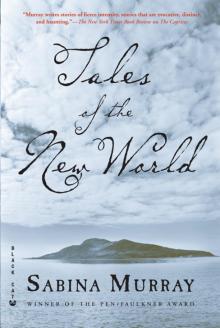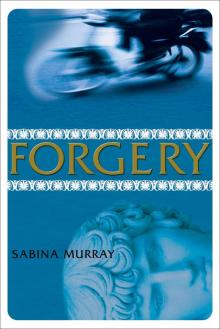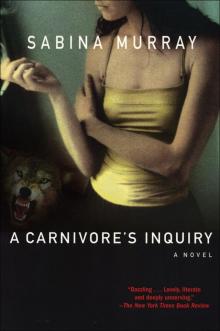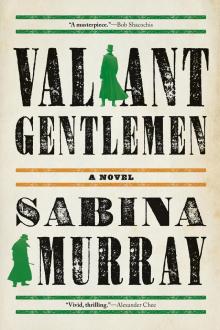- Home
- Sabina Murray
A Carnivore's Inquiry Page 6
A Carnivore's Inquiry Read online
Page 6
The only others watching were an eager mother with her uninterested children—two boys—one overweight, the other thin. The mother smiled at me, then blinked her caulked lashes in rapid succession, batting them like butterfly wings.
“Lovely,” she said. Her fat son cowered; the thin one poked an expressive finger down his throat. She reached into her purse and produced a quarter, which she held up for me to see, then dropped the coin with a muffled clink into the violin case. She shook her head in delight and squeezed her soft, white hands together. Her fuchsia lipstick had adhered thickly to her two front teeth. She exuded an aura of perfume aged in wool.
One of Boris’s librettos was for Les Mohicans, a French opera loosely based on the Fenimore Cooper book. In the opera Indians kidnap the girl, her colonel father, her lover and—of all things—her dancing instructor, Jonathas. In the pivotal scene of the opera, Jonathas plays his violin and the Indians begin dancing, hypnotized by the music. It is thought that if the Indians were not dancing around they would be preparing to eat them all, and that once Jonathas stops playing, the Indians will indeed do just that. So Jonathas plays and plays, never taking a break, until English troops arrive and save them. This scene had seemed particularly silly to me when I read it, but now, in thrall to the music, it seemed possible. Even likely. I opened my purse and took out a hundred-dollar bill. I held it up for the mother and the gaping children, then placed it carefully in the case.
The music came to a close and I ducked into a doorway to view the musician. He stood holding the bill in his right hand, looking street end to street end for an explanation, the stilled violin held loosely in his left. He put the bill in his pocket and raised his bow again, but after the first whine of the strings, he changed his mind. He packed up his violin and left with his whistling of Massenet’s Meditation straining through the fog, impossibly close, lost in a screech of a car’s tires, and then gone.
I took my time getting back to the restaurant, even though my headache was long gone. Boris was going to be angry. I had the money only because he’d given it to me to buy lunch, decided to charge the meal, then forgotten about it. Boris had honored my request to have cigarette money by meting out exactly ten dollars at a time. I decided to tell Boris that the hundred dollars was lost—blown or stolen out of my purse. A gust of wind, a petty thief, it didn’t matter to Boris as long as his precious money hadn’t fallen victim to generosity. I rounded the end of the pier.
Boris was done with his lobster and nearly half my steak by the time I returned.
That night I couldn’t sleep. Boris was snoring away, but I got bored lying there, despite the comfort of the bed. I was hungry and didn’t know where I could get any food. I went downstairs to the living room of the bed-and-breakfast. The door to the kitchen was locked, but I remembered there being a crystal dish with peppermints in the living room. I entered the living room through a narrow door. The bustle and cheer was gone, replaced by silent gloom. The only sound was the ticking of the grandfather clock that stood guard in the corner. A pair of bookcases flanked the fireplace. The majority of the volumes were vellum bound and lettered in gold, and had, I suspected, been purchased by the yard.
I ate a peppermint. That done, there was no more to do in the living room than there had been in the bedroom, except now I wasn’t menaced by Boris’s snoring. What was there to do in Maine? The young violin player had been very attractive. I surprised myself with a little fantasy of him playing for me alone, and then for me naked. I wondered where he was. The moon was shining through the window and light pooled on the floor close to my chair. Out in the cold night, I heard a cat at first calling and then attacked. There was a distant crash of trash cans. A draft had worked its way into the room and a stack of pamphlets left on the mantel slid to the floor. The grandfather clock shuddered to the hour—midnight—and after a labored click let loose its cacophony of bongs. Then rain blew in with a patter and I felt the power of a dark patron moving over the city, as if the raindrops were fringe sewn to the edge of his cloak.
I wanted some fresh air. From the street I had noticed a small cupola at the top of the bed-and-breakfast, which must have been a widow’s walk in an older, saltier time. Boris and I had a room on the third floor. I had noticed a narrow door to the left of the bathroom. This had to open to a set of stairs and at the top of these, I thought, I would find the cupola.
The door was unlocked but jammed shut, and I had a hard time opening it. I’m sure the door was seldom used. The stairs bowed in the centers and in some places were splintered beyond wear—the work of insects. I heard the scurrying of rats in the wainscoting. The dust was thick, which made my footsteps quiet. I was blanketed in darkness, ascending unsteadily. The steps must have been built for people whose feet were six inches long. The banister rattled in my hand. Finally, the stairs ended and I found myself on level ground. I took one slow step after the other, until I felt something brush against my face. After a moment of panic, I realized that I had reached a string and when I pulled it a dusty bulb came on, glowing softly.
I was in an attic where, piled against the yellowed walls, were several generations’ worth of junk. The toys of a dozen childhoods had been kept, as though the adults thought they might one day return, one day find themselves again entertained by roller skates or wanting to read The Secret Garden. There was a pair of wooden skis leaning in the corner, a box of paperback books—thrillers from the seventies—the recent aged and somehow the more tragic for it. A weeviled Persian rug covered some space of floor, exquisite in parts, but now food for moths. A veil of dust lay over all the objects and tinted every surface a shade of blue. I felt sad for these things and for people, who die one object at a time.
In the north corner was a tiny cane-backed wheelchair. It gave me the shivers. Why did people keep such things? Surely they weren’t so pessimistic as to think that another family member might need it. Why were the steel crutches and thick-soled shoes for housing leg braces still here, along with the hospital bed and child-height commode? I thought of physical torment, twisted limbs, and an early, painful death. But how could one let go of any of it? I walked over to the wheelchair and pushed it. The wheels moved noiselessly, leaving a six-inch trail on the dusty floor.
Maybe the parents couldn’t face a time when their little one would no longer need to be wheeled into the sun or lowered onto the toilet. Perhaps there would never be an appropriate time to junk that bed, which had been the site of so many sleepless nights and some of peace, where the mother rested her hand on the child’s brow wondering how she would not always be afforded this luxury. The thick-soled shoes implied steps shuffling along the uneven cobbles outside. How could anyone ever admit that the time for these shoes had passed?
I thought of my mother, who had regarded me throughout my childhood as a daily miracle, our time always too special. But it was she who was sick. It was her pain that made every second count. And in the end, it was she who left, faded away, like a photograph slowly becoming overexposed, until she existed only in the tubes and pumps of her hospital machinery.
Across the room, another staircase, small and spiraling, rose to a trap door and through this hole I climbed into the cupola. It was a black, boiling night full of menace. The air was thick and salty, the moon hidden behind a cape of dark cloud. Bats flew around squeaking to each other. A sweeping arm of light lit the harbor briefly and then withdrew. On the sidewalk below a couple, arm in arm, stumbled from a bar. She was laughing a fat laugh and he returned it with a grumble full of lust. She threw her arms around him and they groped and sweated on the path below. I thought of clinking glasses, of thick embracing smoke, of the creased brows and grinning faces one found in bars. Boris was dead to the world and I had at least an hour till last call.
I dressed quickly and left the bed-and-breakfast through the living room. I had a key to the front door, one to our room, and another, smaller key, but its purpose had not been explained to me. Fore Street, where the bars were lined up f
or easy comparison, was only a couple of blocks from where we were staying. I could soon hear laughter and the slurred haranguing that goes with heavy drinking.
Lines snaked out of bars and people smoked on the sidewalk. I could hear them laughing as they waited for the first pint or tumbler to float them out of Friday and into the weekend. The line moved quickly and I was soon at the door. The door swung open, releasing gusts of laughter and cigarette smoke into the street. People exited and entered, body for body. I could feel men’s eyes pass over me, then move on. The bar was full of smoke and hillbilly rock. I felt instantly better. A red-haired man peered over his Scotch at me with glazed eyes. A woman with a shelf of crimped bangs swayed him back to her by his elbow. Her mouth narrowed and she looked at me disapprovingly, but I really wasn’t interested. I nodded to the bartender.
“I’ll have a Guinness,” I said.
“This is a brew pub.”
“Whatever stout you’re serving.”
There was nowhere to sit, just rows of sweaty backs. I wrestled my way to the bar and took a stool recently vacated by a man who had left in such a hurry that I knew he was throwing up. I had hardly wiped the first froth from my upper lip when someone tapped my shoulder. There was a young guy standing behind me. He smiled pleasantly.
“Can I get that for you?” he asked.
“Thanks, but I’ve already paid for it.”
His face fell.
“You can get my next one.”
He was wearing a big sweater and had shoulder-length, dirtyblond hair. He raised his drink and I returned the gesture. I found him good-looking, in an angular, Scandinavian way. I was sure he had an athletic hobby like mountain biking or extreme skiing. If he smoked, he only smoked pot. He had a big, easy smile and perfect teeth. I looked down at his shoes, brown leather hiking boots.
“Were you planning any climbing tonight?”
“What?” He was shouting, we both were, because the bar was so loud.
“The boots. Those are for climbing, aren’t they?”
“No. These are trekking boots. I use shoes for climbing.”
“Shoes?”
“Yeah. They kind of look like bowling shoes, except with thin rubber soles? You don’t wear socks with them?”
I didn’t know. “Do you work around here?”
“Freeport,” he said. “L.L. Bean?”
“Ah,” I said. “Duck boots.”
“Duck boots.”
I raised my glass and in four long gulps downed the remaining beer. “You can get me that pint now,” I said.
He smiled and threw himself onto the bar. He had mastered the art of beer purchase. He seemed to know the bartender, who shot him a knowing look, implying that I was dangerous. He, in turn, smiled, implying that he could handle me.
He handed me my beer and I thanked him.
“Do you live in Portland?”
“No,” I said. “I’m on vacation. I live in New York.”
“Cool,” he said.
I smiled and looked patiently around the bar. Aside from the girls who clung to their boyfriends, the bar seemed overrun with men. “Where are all the girls?” I asked.
The guy shook his head. “It’s Bad Billy. They won’t come out.”
“Ah yes. William Selwyn. Have that many people died?”
“No. But it’s still a problem.” He lowered his eyebrows. He was concerned.
“What’s your name?” I asked.
“Malley.”
“Malley?” It sounded like a dog’s name. “How original,” I said. “My name is Katherine.” I extended my right hand. Malley wiped his hand on pants and shook it. Clearly he seldom shook hands, or maybe not with women.
“I like the name Katherine,” he said.
“Really?”
“Yeah.”
“I’ve always found it unbearably boring.”
“Are you named after someone?”
“No. You ask a lot of questions, Malley.”
“Do I?”
“I think it’s compulsive.”
The windows of the bar were steamed over and I felt safe. Portland was a fun place with young people. New York seemed far away, at least Boris’s apartment did. Malley had once worked at the bar and convinced the bartender to let him go downstairs to make me some fish and chips, even though the kitchen was closed. The fish and chips came in a little basket. There was ketchup, but Malley hadn’t been able to find any tartar sauce. I lied and said that I didn’t like it anyway.
“Can I call you Kathy?” he asked.
“No one else does. Never Kathy. Never Kate. ‘Katherine’ is solid and respectable.” I was momentarily thoughtful. “That’s what my father says.”
“Any brothers and sisters?”
“I’m an only child.” I smiled, as if this explained something. “My mother wanted to call me Marion, after her great-aunt.”
“Did you like Aunt Marion?”
“Yes, but my father didn’t. Aunt Marion liked to tell dirty jokes.” Aunt Marion had died shortly after I turned eight. I could still conjure up her scent: Youth Dew struggling beneath a cloud of Silk Cut.
“She sounds cool.”
“She was, but she didn’t like her name. According to Aunt Marion, everyone born in 1903 was named Marion; 1903 was the Marion Year, dedicated to Mary.”
“Why weren’t they all named Mary?”
I thought for a moment. “I don’t really know.”
I pushed away my basket, which was now empty except for wax paper and grease.
“Let’s get out of here,” said Malley.
We escaped the bar and stood on the sidewalk.
“Where should we go?” asked Malley.
“I don’t know.” The temperature was dropping and I could see my breath. “Let’s go look at the boats.”
We were quiet. I couldn’t stop thinking about Aunt Marion, but Malley wasn’t bothered by the silence. I guess that’s what people who spend their time with rocks and trees are like.
Aunt Marion always reminded me that she knew how to have a good time. I think she said this because she was worried about my mother, who, even if she’d been in good health, still lived with my father and hadn’t had fun since 1968. She told me stories of riding in cars with boys (I think they were all from Georgetown, except for one football player from Boston College who had huge hands and went by “Honey”) and smuggling liquor into dance halls strapped to her legs by her garters. She said, “I carried it way up there and boy did it tickle.” Women knew how to dress then because they wore hats. Women did not know how to dress now because they did not wear hats. Women didn’t know how to have fun now, because sex was seen as “liberation” instead of “fun.” She said women were now liberated, but were no longer fun.
I wondered if I was fun, if anyone had been fun since 1928.
“Malley,” I said. He was rolling a joint. “Do you think I’m any fun?”
He thought about this for a minute. “Sure.” He lit up.
He offered me a drag and I waved him off. “I think I’m having an existential crisis,” I said.
He was puffed up like a dying a fish, but he nodded sympathetically. Finally, he exhaled. “It’s Bad Billy,” he said.
“Really. Why?”
“Everything gets more important when there’s a serial killer on the loose.”
I thought about this. He could be right.
“I mean,” said Malley thoughtfully. “Why does he have to go around killing people? You can be really mad without killing people.”
“Isn’t it usually something in one’s childhood?” I suggested.
“Like in Psycho?”
“Yeah. Like that.”
Malley nodded thoughtfully. “It doesn’t seem right.”
“Some people kill for love.” I got up and looked at the water, the way the moon reflected up out of the pooling grease and fish guts.
“It’s still not right,” said Malley. He had a fine sense of morality, of right and wrong, l
ike most people who weren’t bright enough to think independently. “You can only kill something because you need to eat.”
“Does that extend to other people?” I asked.
Malley had his lungs full. He shook his head vehemently. “Of course not,” he said, his teeth clenched, the air stuck in his throat.
I sat on a lobster trap and looked into the harbor.
“What if you kill for love?”
“Nah,” said Malley. “Who kills for love?”
“There’s a story, someone called the Monster of Montluel. His real name was Martin Dummolard. He was in love with his landlady.”
“So?” said Malley.
“The two of them terrorized Lyon at the end of the nineteenth century.”
“What did they do?”
“They killed people and ate them.”
“Are you sure?”
“Yes.”
Malley shook his head. “That’s fucked up.”
I nodded.
“Why’d they do it?”
“For each other?” I pictured young Martin, a country boy coming to Lyon lured by the possibilities of city life. He longed for a place where the people outnumbered the cows, where conversation introduced more than the possibility of arthritis, labor, and the thick taste of onion grass in the last batch of cheese. His hobnailed boots ring on the cobbles of Lyon and he is overjoyed to have finally left the squelching kiss of mud. “Martin killed for love of Justine,” I said.
“How did he meet Justine?”
“I told you that,” I said. “She was his landlady.”
Martin stands at the door of a boarding house. Everything he owns is in a canvas sack. A knock on the door is met with a loud and harsh order to wait. And he waits. And he waits, not knowing the effort being made up from the chair, through the door, along the hallway in somber thumping effort. Because Justine is a massive woman, a behemoth of her kind, and the power it takes to raise her bulk and propel it, heaving and grunting, from the armchair by the mantel, to the parlor door, to the darkly lit hallway, where the paper sloughs from the walls hanging in limp tendrils like kelp in the Sargasso Sea, is an awesome force, as is she, a woman who is seldom pricked with denials. A woman like this, round and pocked like the moon, pulls others—as if they are water in thrall to tides—in her wake.

 Tales of the New World: Stories
Tales of the New World: Stories Forgery
Forgery The Caprices
The Caprices A Carnivore's Inquiry
A Carnivore's Inquiry Valiant Gentlemen
Valiant Gentlemen